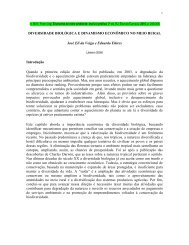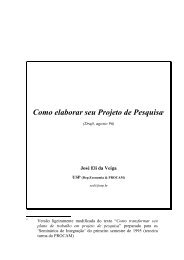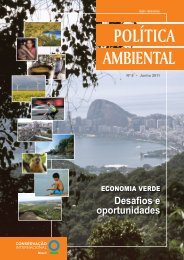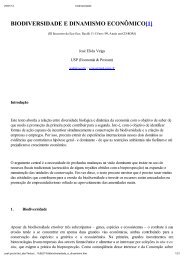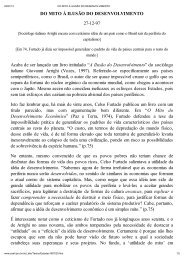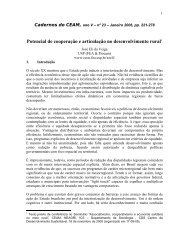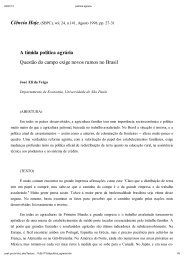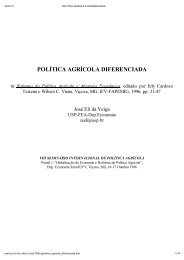sustainable development 20 years on from the ... - José Eli da Veiga
sustainable development 20 years on from the ... - José Eli da Veiga
sustainable development 20 years on from the ... - José Eli da Veiga
You also want an ePaper? Increase the reach of your titles
YUMPU automatically turns print PDFs into web optimized ePapers that Google loves.
134<br />
c<strong>on</strong>cessi<strong>on</strong>s, authorizati<strong>on</strong>s and licences for freshwater resources for ecological c<strong>on</strong>servati<strong>on</strong> ranks<br />
fourth after water for human c<strong>on</strong>sumpti<strong>on</strong>, potable water services, and agriculture and forestry, and<br />
ahead of water for public energy generati<strong>on</strong>, industrial uses, recreati<strong>on</strong>al purposes and o<strong>the</strong>r purposes<br />
(UNEP, <str<strong>on</strong>g>20</str<strong>on</strong>g>10c).<br />
It is also important to c<strong>on</strong>sider <strong>the</strong> role of different groups of people in <strong>the</strong> management of water<br />
resources. Box II.10 discusses <strong>the</strong> role of women in <str<strong>on</strong>g>sustainable</str<strong>on</strong>g> water management.<br />
Box II.10<br />
WOMEN AND SUSTAINABLE WATER MANAGEMENT<br />
Women play a crucial role in water provisi<strong>on</strong>, management and protecti<strong>on</strong>, in order to supply and care for <strong>the</strong>ir<br />
families. This makes <strong>the</strong>m <strong>the</strong> main providers and users of water. Problems arising <strong>from</strong> water mismanagement and<br />
climate change will seriously affect women’s every<strong>da</strong>y lives and workload. In most countries of <strong>the</strong> regi<strong>on</strong>, women<br />
are resp<strong>on</strong>sible for supplying rural households and <strong>the</strong>ir unpaid labour is dedicated to transporting water (where<br />
<strong>the</strong>re is no domestic water supply), preparing food and cleaning <strong>the</strong> home. The amount of time women devote to<br />
<strong>the</strong>se activities, which are necessary for survival, limits <strong>the</strong>ir opportunities for professi<strong>on</strong>al and pers<strong>on</strong>al<br />
<str<strong>on</strong>g>development</str<strong>on</strong>g>. They are also primarily resp<strong>on</strong>sible for <strong>the</strong> irrigati<strong>on</strong> of small crops and feeding animals for household<br />
c<strong>on</strong>sumpti<strong>on</strong>, while men are usually resp<strong>on</strong>sible for major commercial crops. Land ownership and/or tenure also<br />
determine access to water, especially in <strong>the</strong> case of women, who own barely 1% of land and are required to use<br />
community water sources, which very often forces <strong>the</strong>m or <strong>the</strong>ir children to walk l<strong>on</strong>g distances. Poverty and <strong>the</strong><br />
obstacles women face in securing access to productive resources, to technological training in hydrology and to<br />
decisi<strong>on</strong>-making processes c<strong>on</strong>cerning water management (Rico, 1998) c<strong>on</strong>tribute to inequitable water management.<br />
Despite <strong>the</strong> important role played by women in water management, <strong>the</strong> gender perspective is still absent<br />
<strong>from</strong> legislati<strong>on</strong>, public policies and programmes relating to water resources. Current nati<strong>on</strong>al programmes in <strong>the</strong><br />
regi<strong>on</strong> benefitting <strong>from</strong> bilateral and multilateral support fail to take into account ei<strong>the</strong>r <strong>the</strong> different water uses and<br />
specific needs of women and men, or <strong>the</strong> need to ensure equal representati<strong>on</strong> in decisi<strong>on</strong>-making to guarantee water<br />
governance, with <strong>the</strong> result that <strong>the</strong>y allocate no funding to this. In this regard, <strong>the</strong> Governments of Latin American<br />
and Caribbean countries should c<strong>on</strong>sider <strong>the</strong> following order of priorities in <strong>the</strong> c<strong>on</strong>text of multiple and integrated<br />
water use: (i) mainstreaming <strong>the</strong> gender perspective into water assessment, m<strong>on</strong>itoring, management and research,<br />
including watershed management and <strong>the</strong> ecology of water resources; (ii) greater access to safe drinking water and<br />
basic sanitati<strong>on</strong>, to advance in achieving <strong>the</strong> Millennium Development Goals; and (iii) promoti<strong>on</strong> and regulati<strong>on</strong> of<br />
women’s participati<strong>on</strong> in community water boards to make water available for irrigati<strong>on</strong> and food producti<strong>on</strong>.<br />
Source: United Nati<strong>on</strong>s Development Programme Regi<strong>on</strong>al Centre, America Latina Genera, Boletín Genera, August <str<strong>on</strong>g>20</str<strong>on</strong>g>10<br />
[<strong>on</strong>line] www.americalatinagenera.org/boletin/boletin-es-agosto-<str<strong>on</strong>g>20</str<strong>on</strong>g>10.html.<br />
(d)<br />
Climate change and water resources<br />
Climate change is posing new challenges to <strong>the</strong> regi<strong>on</strong>’s water resources. Expected increases in<br />
temperature and evaporati<strong>on</strong>, al<strong>on</strong>g with precipitati<strong>on</strong> increases or decreases and <strong>the</strong> resulting change in<br />
flow rates, will alter water availability and quality. In some cases, rising sea levels will cause saltwater<br />
intrusi<strong>on</strong> into aquifers near <strong>the</strong> coast. Extreme phenomena of floods and droughts, as well as<br />
desertificati<strong>on</strong> processes (CRA, <str<strong>on</strong>g>20</str<strong>on</strong>g>09), will exert a very heavy impact <strong>on</strong> water. Rising temperatures<br />
are also having a marked effect <strong>on</strong> glaciers and <strong>the</strong>ir role as water sources and runoff regulators in<br />
fragile ecosystems (CRA, <str<strong>on</strong>g>20</str<strong>on</strong>g>09), which is a special cause of c<strong>on</strong>cern for Andean countries (Andean<br />
Community, <str<strong>on</strong>g>20</str<strong>on</strong>g>08).



